Bullets, Wizards and Too Much Love
It wasn’t the Gunfight at the NBA Corral that turned Gilbert Arenas’ life into a bittersweet story. That happened a long time ago -- at birth -- but that’s how it works in a subculture ruled by stars, in which everyone prefers the sweet to the bitter.Is a culture that serves up too much unconditional love to blame for the troubles of beloved NBA screw-up Gilbert Arenas?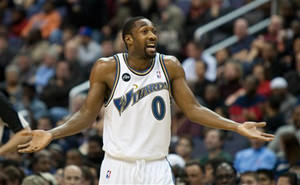
Editor’s note: This story has been updated to reflect new information.
It wasn’t the Gunfight at the NBA Corral that turned Gilbert Arenas’ life into a bittersweet story. That happened a long time ago — at birth — but that’s how it works in a subculture ruled by stars, in which everyone prefers the sweet to the bitter.
Arenas was giving off distress signals, or wiggy signals, or something-isn’t-quite-right signals long before he and Washington Wizards teammate Javaris Crittenton were alleged to have pulled guns on each other in an argument about Arenas’ refusal to pay what he lost in a card game.
If what happened was bad enough, it probably wasn’t as bad as the version the press ran with, lowering the level of this saga to yet another farce.
The report that the players drew their guns came from one story by the New York Post’s Pete Vecsey and David K. Li, which attributed its account to an Atlanta friend of Crittenton, Kendrick “Bookie Ball” Long, who said Crittenton told him what happened.
“He [Arenas] was f- – -ing with him,” Long told the Post. “He [Crittenton] was just defending himself!”
The Post quoted “league security sources” for the specific assertion that the players actually pulled their guns. However, it’s common to camouflage sources who ask to be protected, so the Post may well have had a source, not two or three, who was close to Crittenton and happy to put it on Arenas.
Arenas, who was refusing to pay $1,100 he had lost in a card game a few days before, was alleged to have brought four unloaded pistols to the Verizon Center and put them in Crittenton’s cubicle with a note that said, “Pick one,” regarding it as a joke.
Crittenton then crumpled up the note, laughing, got his own gun, loaded it and actually chambered a round. However, the witnesses told the Post that Crittenton didn’t point the gun at Arenas as both continued to treat it as a joke.
Nevertheless, the most sensational story has eclipsed all others. The incident may always be remembered as the time two players drew down on each other.
Arenas has more to worry about than having been placed on an indefinite suspension that NBA Commissioner David Stern is expected to make season-long at a cost of $9.9 million of Gilbert’s $16.2 million salary.
Arenas’ situation is similar to that of the New York Giants’ Plaxico Burress, now serving a jail sentence after his pistol went off accidentally in a club, shooting him in the thigh. Burress got two years, convicted only of illegal possession of a firearm, which is what Arenas is clearly on the hook for.
However, even with the case going before a grand jury and Al Sharpton jumping in to demand a harsh penalty to show African-American youths the error of their ways, Arenas may not get the full “Bonfire of the Vanities” treatment Manhattan D.A. Robert Morgenthau gave Burress.
Burress was a talented screw-up on the football field who tried everyone’s patience. Arenas has tried everyone’s patience, too, but remains a beloved kind of screw-up, diminishing any hue and cry for D.C. authorities to lock him up.
In the aftermath, New Jersey’s Devin Harris said 60 to 75 percent of pro basketball players carry guns. If you cut his lower figure by half, but add in all the armed members of entourages and the professional bodyguards whom many stars hire, that’s a lot of firepower for a basketball league.
It’s not a recent phenomenon. Charles Barkley recently said he still carries a gun at age 46, 10 years after retiring, noting:
“People know we got money, they know our schedule but I feel safer with it. I’ve carried a gun since 1984. I understand it’s dangerous, I understand if I pull it, I better use it. But I’ve never, ever come close to using it.”
That’s fortunate, given Barkley’s history of late-night incidents, including one in which he threw someone through a plate-glass window.
Stars in all sports now feel entitled and paranoid at the same time, seeing the public as adoring and available on the one hand and demanding and dangerous on the other, from groupies to macho challengers and stalkers.
No one should begrudge their feelings of entitlement, at least, because we gave them to them. Dr. Robert Millman, a professor of psychiatry at Cornell Medical School, calls it “acquired situational narcissism,” suggesting that being obsessed with yourself isn’t so neurotic when the world does, in fact, treat you as a superman.
In my experience, most people, whether or not they realize it, become groupies around stars. Hard-boiled press guys stammer in their presence. Titans of commerce pay them huge fees to speak to their employees (and hang out with them). Women fasten themselves to them, and not just the ones at arena exits.
It shouldn’t be surprising that with super-entitlement comes super-fear of losing it and super-skepticism about people’s motives.
The easy way to avoid trouble is by avoiding trouble, but there’s nothing common about common sense in lives as peculiar as these.
Boston Coach Doc Rivers likes to invoke the 12 o’clock rule his mother taught him: Nothing good happens after midnight, so be in by then. His players listen the way Doc probably listened at their age.
If adulation awaits, who are they to hide?
Why did they become stars in the first place?
If you haven’t noticed, stars aren’t like us. They were once, and will be again, but while they’re stars, they’re what we make them … rich and crazy.As part of the deal, they’re now allowed to define themselves. Talking to players was once an important step up from the age of storytellers, like Grantland Rice, who from the press box created a picture of Notre Dame’s Four Horsemen “outlined against a blue, gray October sky.” Now athletes’ explanations, which are largely BS — as yours or mine would be if we were to define ourselves — are received so uncritically it’s as if the press is just conduit wire.
When NFL bad boy John Matuszak presented his pain as raucous swagger — “You better not cruise with the Tooz or you’ll get bruised,” etc. — the world laughed with him … right up until the day he dropped dead of an accidental Darvocet overdose.
If getting busted for playing cops and robbers with real guns is a particularly juvenile twist on a heroic fall, Arenas has been riding for this for as long as he’s been riding.
You didn’t need a TV shrink to see the distress in his wild behavior after a childhood in which his mother abandoned him and he was raised by his father, whom he met for the first time when he was almost 3.
Gilbert Sr. picked up his son in Florida and drove him across country to his home in Southern California’s San Fernando Valley, noting later, “On our way back, I don’t think he feel asleep. He must have thought at the time I was going to take off on him, so he didn’t go to sleep.”
As a young player, Gilbert Jr. was given to calling out better-known players, nonstop pranks and unrestrained behavior in general. Teammate Jason Richardson called him “Baby Ron Artest.”
As driven as he was wacky, Arenas was so good and so much fun he made up for the bad passes and crazy shots, winning a place in everyone’s hearts. The straitlaced NBA ran his outrageous blog on its website. In a city that doted on the Redskins and barely knew the Wizards existed, Michael Wilbon, the ESPN commentator and Washington Post columnist, said Arenas was the most popular local athlete.
In 2008, the Wizards gave Arenas a new six-year, $111 million contract, even though he was coming off two knee surgeries and would soon undergo a third that would sideline him most of the next two seasons.
The team could have tried to get him to take less, or let him walk. Even with his bad knee and his baggage, they couldn’t bear to think of sticking a mere player in his place.
It was a modern tale to the end. As wacky as Arenas was, he was entitled to his you-can’t-be-serious reaction to the sensationalized press coverage. Being Gilbert Arenas, he then hastened his suspension by clowning around in an impromptu skit in pre-game introductions Tuesday in Philadelphia, when his teammates circled him and he stuck up his thumbs, extended his index fingers and pretended to shoot them.
Arenas was also apologizing profusely in all his public statements, although that, of course, didn’t get the same play. The Washington Post’s Wise reported Arenas also covered for Crittenton when talking to police and that he told his teammate he would take sole responsibility.
Commissioner Stern, who had been content to wait until the legal process played out, suspended Arenas the next day, saying his “ongoing conduct” showed he was “not currently fit to take the court in an NBA game.”
It’s a cruel irony for the Wizards, né Bullets, whose late owner, Abe Pollin, changed their names because of what was going on in D.C., and after being sensitized further by the assassination of his friend, former Israeli Prime Minister Yitzhak Rabin.
After years of high-scoring frustration with the zany Arenas, the Wizards look like they’re going to have to try reinventing themselves anew.
That’s how it works: Stars rule absolutely until the day they don’t, after which everyone picks up and moves on, yearning for nothing more than stars who turn out a little less complicated.
Mark Heisler covers the NBA for the Los Angeles Times, where he has worked since 1979. He won the 2006 Naismith Hall of Fame’s Curt Gowdy award for outstanding basketball writing.
Your support matters…Independent journalism is under threat and overshadowed by heavily funded mainstream media.
You can help level the playing field. Become a member.
Your tax-deductible contribution keeps us digging beneath the headlines to give you thought-provoking, investigative reporting and analysis that unearths what's really happening- without compromise.
Give today to support our courageous, independent journalists.
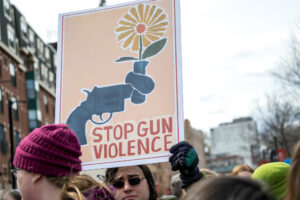

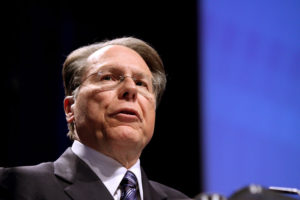
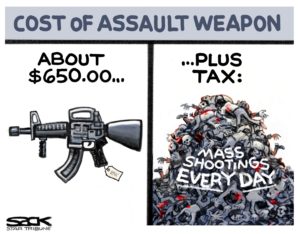
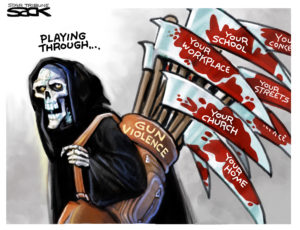
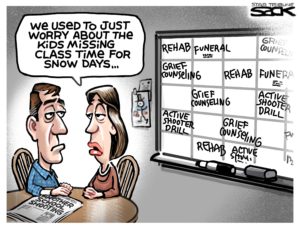
You need to be a supporter to comment.
There are currently no responses to this article.
Be the first to respond.